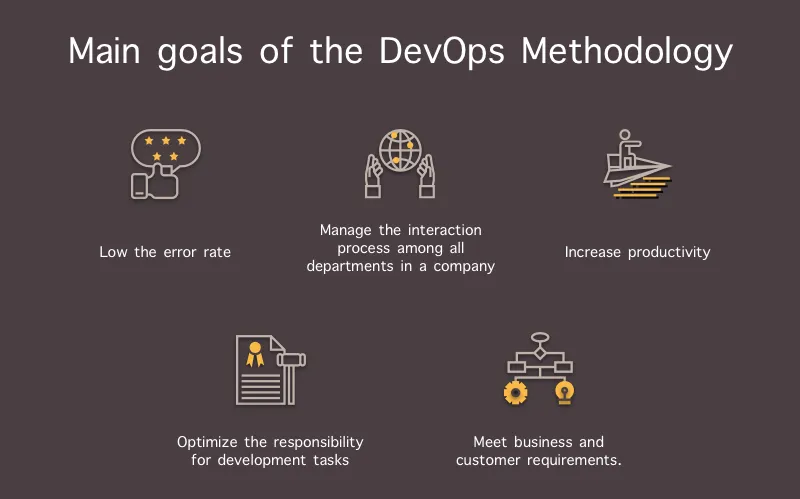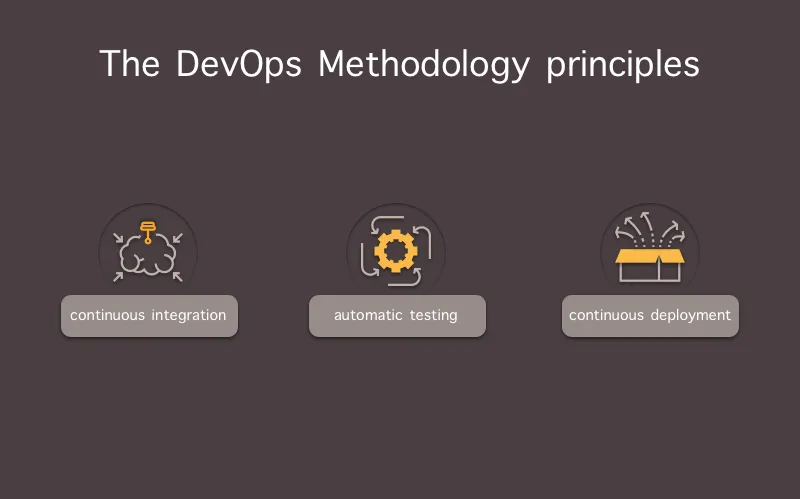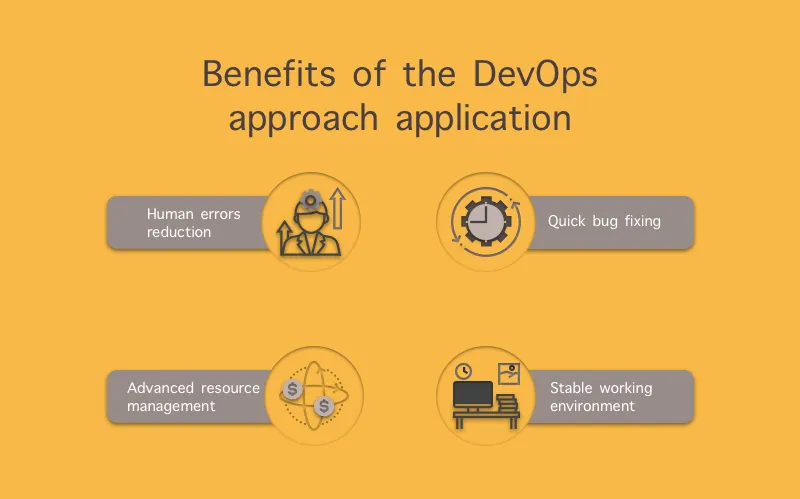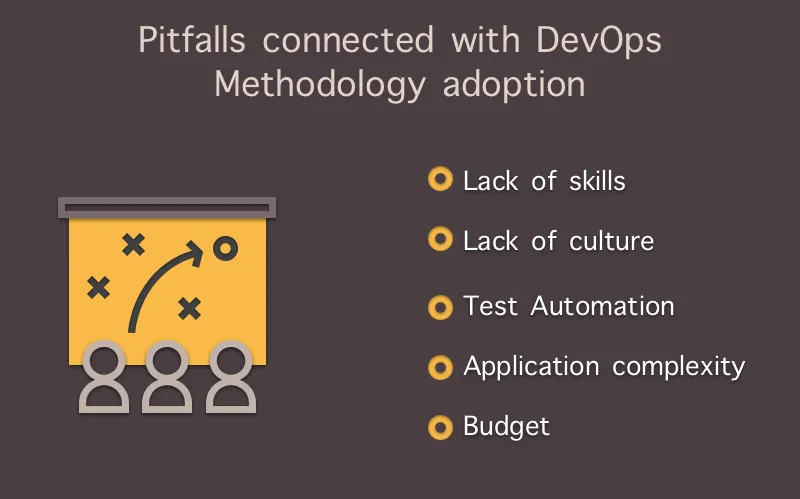Clear Explanation Of The DevOps Principles: All Pros and Cons
25 Oct 2017
10 Min
5029 Views
Modern market conditions make new software development demands. One of the main issues nowadays is time. And the main goal of development teams is to reduce the time of executing a project. That's why in this article we decided to discuss how to maximize the effectiveness of your team and how to meet business requirements in a fast developing IT sphere.
To achieve this we need new methods and approaches which can establish an effective communication process between different functional departments of a company. One of the latest approaches which helps to cross this barrier is DevOps methodology. To understand how DevOps works we need to shed light on the main terms and DevOps principles.
DevOps definition
There is no clear explanation of what this methodology really is. What is more important is to understand the main DevOps goals. Here are most of them:

DevOps goals
Many novices want to know the difference between Agile and DevOps. DevOps is closely related to Agile methodology but they are not the same. In addition to the interaction between the development and testing departments, the operating and deployment department is also connected to the product creation process.
Basically, DevOps automation tools are focused on administration and automatization processes. However, unlike a usual administrator, DevOps works with programmers more than with users. The main purposes of DevOps support are automation and bundling of software for the full development cycle.
To be more clear, let's give a simple example. A company can use different programming languages to create a product. Here, DevOps task is to be able to configure different environments for the operation of this software. Nodejs, PHP, and Ruby are three absolutely different programming languages, however, for a client, they are just three different sites. This customer doesn't even realize how the systems work from the inside (web-server, databases, backend, frontend and so on), so DevOps does all that. DevOps structure is also responsible for the server (monitoring, load optimization).
Can't choose the best technology to learn? Here are the Top 20 development languages of 2024. Read and choose!
The most important thing here is to build a dialogue between all parties. The need for such a dialogue is justified by the fact that a poorly organized process of interaction leads to a situation when a well-developed products cannot be correctly implemented. As a consequence, the customer and the end-users of the product are not satisfied with the result, the project fails and the timeline and cost of the development are constantly growing.
DevOps is aimed at the active interaction and integration of development specialists and information technology specialists. Such established communication can help organizations to create and update software products and services faster. Let's look at the reasons for the disruption of the interaction between the company's departments:
Geographical division
The geographical division of the development process as well as the IT system adjustment (for instance, different offices, departments, buildings, and in some cases, even countries).
Different tools
Different tools used for the development and maintenance of IT systems. In some cases, various issues can appear even when the same set of tools was used, but in a different way.
Misunderstanding
Each party understands the process of product implementation in it's own way. Failures occur when IT professionals and developers implement software solutions each in their environment, change the location of files and the configuration of the environment, etc.
Lack of communication
Lack of continuity of interaction and communication. When bugs and failures in the system have accumulated, the implementation process becomes a chaotic educational process. Why does it happen? Because the issues that have been accumulating for a long time should be solved immediately.
In order to speed up all processes and avoid downtime, you may need the DevOps services. The process of software development and delivery, as a rule, consists of the following steps: planning, development, testing, and deployment.
According to the methodology, the project is divided into smaller parts, in which the product is implemented in stages. It is performed, first, to present a product to the audience as quickly as possible and receive feedback, and secondly, because the phased integration is more productive. You can find the main principles of the DevOps methodology below.

DevOps principles
Continuous integration
The essence of this step is aimed at earlier detection of problems and malfunctions. After the developer has completed the implementation of some part of the code, he or she saves it to the version control system. Usually, for these purposes, developers use TFS, SVN or Git.
After that, a robot (TFS or TeamCity), which monitors the working version changes, and starts the project assembly. Based on the results of the assembly, the developer and other project's stakeholders are informed whether everything went well or not. Thus, if the assembly fails, the developer will immediately find out about it.
Automatic testing
This step is aimed at getting to know whether there are bugs in the assembly or not as soon as possible. And if there are, developers can start fixing them immediately, without waiting for the results of manual testing. Load testing and application performance monitoring are also performed during this stage. These steps are needed to find out whether a page would crash if thousands of users opened it, before the product release.
Learn more about automatic testing, watch our short video about testing and quality assurance at Cleveroad!
Continuous deployment
This phase can be started if all automatic tests were successful. If you are confident in your tests results, automatic installation in the appropriate environment could be started. It can be a test or product environment. Of course, the goal of these steps is to optimize resources and accelerate the delivery of the product. And now, let's analyze who has to apply DevOps methodology and why.
Why do you need to apply DevOps methodology?
The fundamental purpose in any IT company is to take the idea from the moment of it's birth and bring it to where it starts making money. DevOps methodology of is based on the idea of eliminating the main issues of development and maintenance processes, which will allow your business to work with innovative ideas, change and grow faster, more efficiently and reliably, along with risks reduction.
Who needs this approach? To tell you the truth, the application of DevOps principles can be the right decision for any project. And if we are talking about complex projects, their success as a whole, as well as profitability, often depend on the correct application of this methodology. The more components you need to integrate (for instance, in the case of large enterprise systems development with multiple modules that need to work as a single unit), the more benefits you get using DevOps. The methodology is suitable for companies that need to release new versions of their product frequently. This is because DevOps approach is contributed to the continuous development and delivery of software. As well as that, startups will also find this methodology useful, since it can reduce costs and accelerate the process of developing a quality product.
Find out IoT business opportunities to benefit from them
If we take a look at a set of specific practices related to virtualization, containerization, the automation of infrastructure management, the most important thing here is that the company and the project should reach such a level and size that the costs needed to organize these practices will be lower than the costs for management infrastructure without them. Therefore, you have to decide if DevOps implementation is really worth it. The DevOps advantages you get consist of saving time, improving the quality of the product and not only the entire team but also the clients. Moreover, there is a long list of DevOps benefits, for instance:

DevOps advantages
Quick bug fixing
Thanks to improved communication and cooperation processes between departments, you can identify and fix bugs at any stage of the development cycle. DevOps approach can save you a tidy sum if you are working on an app where bug fixing is very an expensive process.
Advanced resource management
When you are working on an application or software development, developers and testers are waiting for the working material to continue doing their jobs all the time. Agile and DevOps guarantee that the development will be much faster at the testing stage.
Human errors reduction
DevOps minimizes the chance of a human error during the development and iterations deployment.
Stable working environment
Stability is the key in any business process, and this is exactly what DevOps provides. Organizations that apply DevOps practices move more quickly to the deployment phase and have less of a chance to fail.
Issues with DevOps adoption
Although this all sounds very promising, the implementation of this methodology is a painstaking and complex task. It requires effort and training of all parties involved in the development and product implementation processes. We want to shed light on some DevOps disadvantages that may occur when you are implementing a DevOps lifecycle process in your company. Here are some of the most common ones.

Problems with DevOps
Lack of skills
A team needs to be taught to apply DevOps. Company has to standardize all processes and common operational procedures.
Lack of culture
Companies need to focus on building a culture of interaction with common goals. It is also important to find employees who can lead the DevOps activities within the organization. For example, in Cleveroad, there is a DevOps developer, he monitors the processes of standardization and DevOps automation services and controls all stages of implementation. For mobile applications, for instance, he manages the assembly of an app, which speeds up the testing process and general awareness about the progress of the project. However, not every team needs to hire a DevOps consulting person, they can use DevOps as a service.
Have difficulties leading your development team? Choose Agile methodology and read our easiest explanation of it's principles in our article!
Test Automation
Many companies discard test automation, focusing on continuous integration and continuous delivery processes. However, continuous testing is the key to success in DevOps. From the very beginning, it is necessary to take into account security issues.
Application complexity
As far as this methodology includes an ability for many team members to imply changes, it would be reasonable to use SaaS or cloud infrastructure for such projects.
Budget
Remember open source doesn't mean free. You will have to pay for the integration and exploitation. Often, the overhead costs of implementing automation practices and support are such that they do not even speed up, but slow down the processes inside the company.
So, before you start any automation steps you have to consider very carefully whether this solution is suitable for you. New DevOps technologies and methods are worth of implementation only if they solve real problems but not just because they are popular.
In our company, we came to the conclusion that costs justify themselves. Correctly configured automation for the project speeds up the development process as it allows developers to focus only on writing code because everything else is the responsibility of a DevOps engineer.
In conclusion, we'd like to say that there are lots of pros and cons of DevOps and it's application will suit any company, a large one (as it will speed up the development, testing and releasing of products), and a small one (everyone will be involved in the process). Anyway, it's up to you whether to use the DevOps model approach. The most important is to apply it, to solve real problems rather than artificially created ones. We also hope that our article helped you to understand this methodology better and make the right decision. If you still have some doubts, write us about your project and we'll be happy to help you!
Our next article is going to be about the security of your website, subscribe to our blog and never miss any news from us!
With DevOps you can reduce the number of human errors in your software. Besides, they provide quick bug fixing and advanced resource management. On top of that, organizations that apply DevOps practices move more quickly to the deployment phase and have less of a chance to fail.
Three main components of DevOps are:
- Continuous integration
- Automatic testing
- Continuous deployment
Main issues that DevOps may face are:
- Lack of skills
- Lack of culture
- Test automation
- Application complexity
- Budget
DevOps are meant to detect problems and malfunctions inside the software. They conduct automatic testing of the product and deploy it in the appropriate environment.
The fundamental purpose in any IT company is to take the idea from the moment of it's birth and bring it to where it starts making money. DevOps methodology of is based on the idea of eliminating the main issues of development and maintenance processes, which will allow your business to work with innovative ideas, change and grow faster, more efficiently and reliably, along with risks reduction.
DevOps increases team's ability to deliver software and services.

Evgeniy Altynpara is a CTO and member of the Forbes Councils’ community of tech professionals. He is an expert in software development and technological entrepreneurship and has 10+years of experience in digital transformation consulting in Healthcare, FinTech, Supply Chain and Logistics
Give us your impressions about this article
Give us your impressions about this article
Comments
2 commentsGreat article. For professionals not very familiar with the Devops topic it would be good if you can give some more tangible examples.
this article has helped a great deal breaking down the principles,pro and cons of devops.it has helped me to understand the methodology being a professional learning about devops.thanks to you it was very insightful.